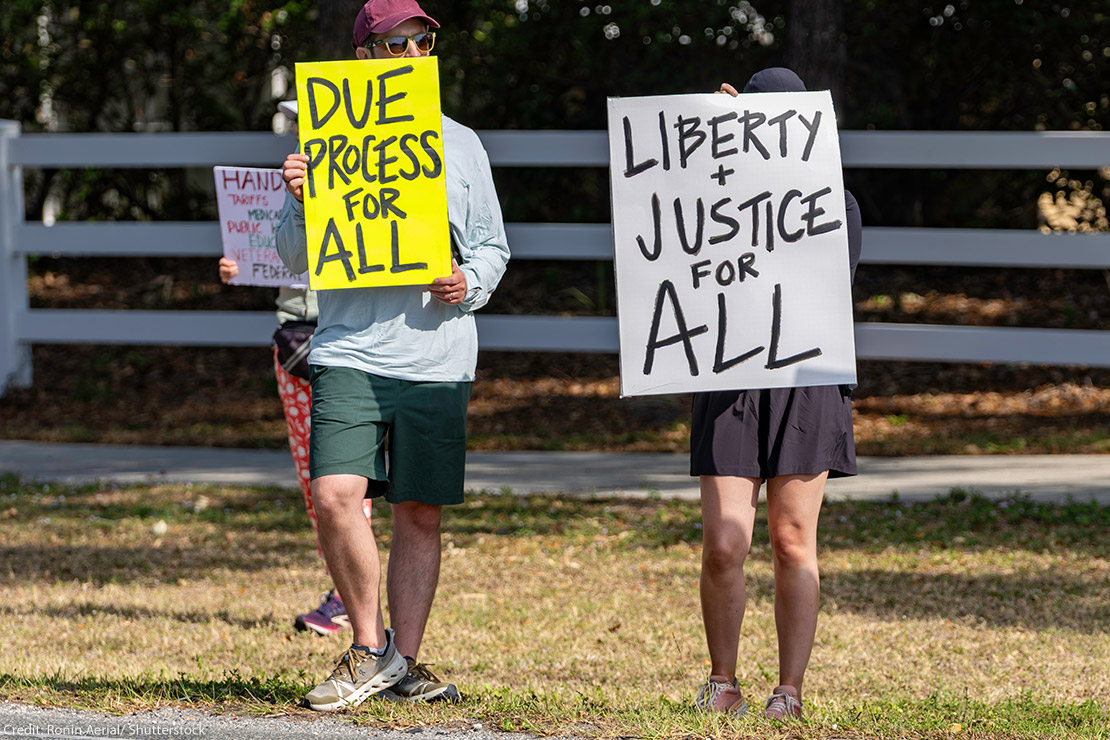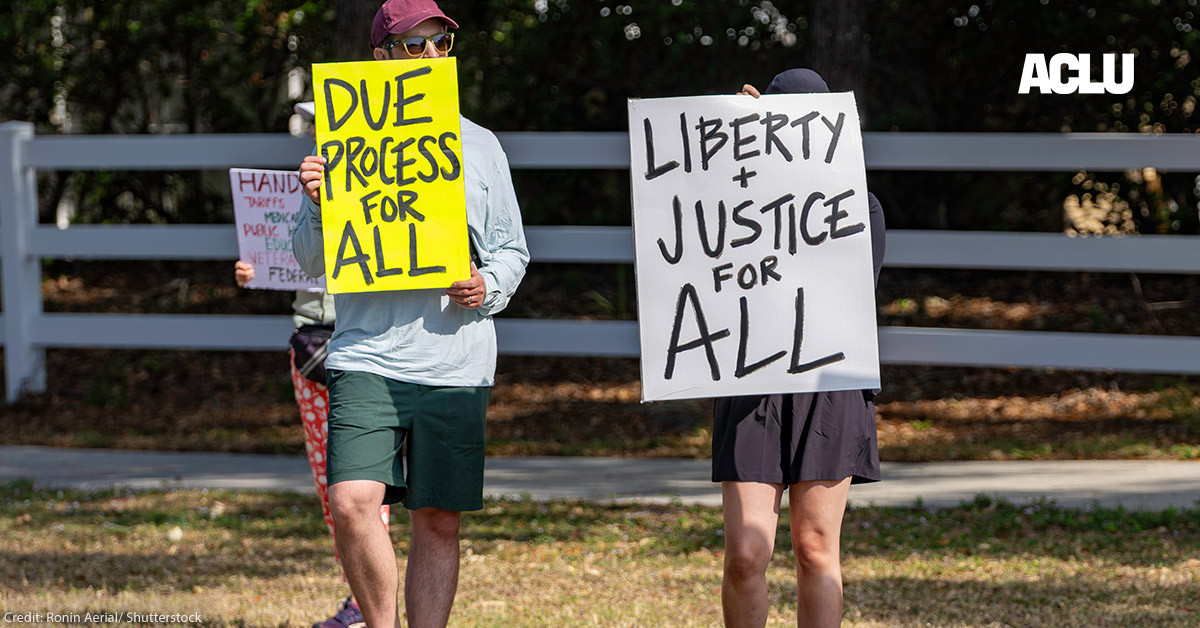Michael Tan, Deputy Director, ACLU Immigrants’ Rights Project
In the first months of his administration, President Donald Trump repeatedly threatened due process, a fundamental principle enshrined in the U.S. Constitution. His attacks have spanned from the arbitrary use of the Alien Enemies Act to deport legal residents, to the unlawful detention of students.
For years due process has protected us from such unfair, unlawful and unequal treatment. But what is due process? Why do we all have a stake in defending it?
What is Due Process?
It’s in the Constitution that the government shall not “deprive any person of life, liberty, or property without due process of law.” This legal guarantee takes two forms: procedural due process and substantive due process.
- Procedural due process means that the government is required to follow a set of procedures when it attempts to deprive someone of their life, liberty, or property. This means that the government must tell you what’s happening, quickly provide you an opportunity to be heard in court, and provide you with a neutral decision-maker (i.e. a court of law).
- Substantive due process means that the government must give a compelling reason before infringing upon certain fundamental rights, no matter what process is followed.
In practice, procedural due process means that the government must give people a chance to defend themselves in a fair hearing before infringing on their rights. It is not merely a formality or an amorphous part of the law. It is a cornerstone of American justice. Our country was founded on the idea that the government cannot take away your rights and liberties arbitrarily and that everyone has a right to defend themselves in court.
Can the Government Restrict or Eliminate Due Process?
Not legally. The Fifth and Fourteenth Amendments explicitly state that no person shall be deprived of life, liberty, or property without due process of law under any circumstance.
The government is required to respect due process before it can take actions that affect a person's life, liberty, or property. This includes:
- Informing you of what is happening, such as why you’ve been arrested
- Providing you with a chance to challenge any accusations made against you
- Providing you with a fair and impartial jury of your peers should you go to trial
These rules are written in the Constitution and apply to everyone – regardless of origin, political beliefs, financial status or criminal status.
Why is Due Process Important?
At a high level, due process is the foundation of our legal system. We are not a monarchy or a dictatorship, meaning that power is derived from the people. The president is not allowed to disregard the Constitution and laws passed by the people’s representatives when dispensing justice.
At an individual level, due process protects us from arbitrary judgement by the government. Whether someone is fighting an eviction, seeking asylum, defending against criminal charges, or protecting custody of their children, we all rely on due process every time we engage with the justice system. Without due process, the government could unlawfully deport people, jail people for lengthy periods of time without a fair trial, demand money, seize homes or otherwise harm people without giving them a chance to defend themselves.
How Has the Trump Administration Infringed on Due Process?
President Trump has spent the first 100 days of his second presidency pushing unconstitutional executive orders and actions and targeting judges, private law firms, public interest firms, nonprofits, and individual lawyers. Taken together, these attacks are a direct affront to the due process protections enshrined in the Constitution.
Expedited deportations: The Trump administration has illegally fast-tracked deportations without fair legal processes. For example, Kilmar Abrego Garcia was shipped to a torture prison in El Salvador in the middle of the night without notice or a hearing, and in spite of a court order prohibiting his deportation. This is a clear violation of due process and the rights owed to all individuals. His story is one of many who have been banished without adequate justification.
Arrests of outspoken students: The Trump administration has directed masked ICE officers to arrest multiple students and professors for their First Amendment protected speech. This is a clear violation of due process, and a warning sign of authoritarianism that people across the political spectrum have condemned. In a free society, plainclothes officers cannot pull us into unmarked vehicles at a moment’s notice.
There are countless other examples, including the most recent suggestion by Deputy Chief of Staff Stephen Miller that the government might suspend habeas corpus,which guarantees that people can challenge their unlawful detention by the government. This and other threats to our country’s commitment to due process put us in precarious positions.
The government does not get to pick and choose who deserves the protections enshrined in the Constitution. Allowing the Trump administration to do so is a slippery slope that leaves us all vulnerable. Lawyers, students, immigrants, and members of civil society will play a crucial role in checking the worst inclinations of this Trump administration. We must meet this moment with fierce and unwavering resistance in the courts, in the streets, and in statehouses across the country. Our Constitution demands it and our democracy depends on it.
The Trump administration's latest attack on our rights threatens our ability to defend ourselves from injustice. We won't stand for it.




